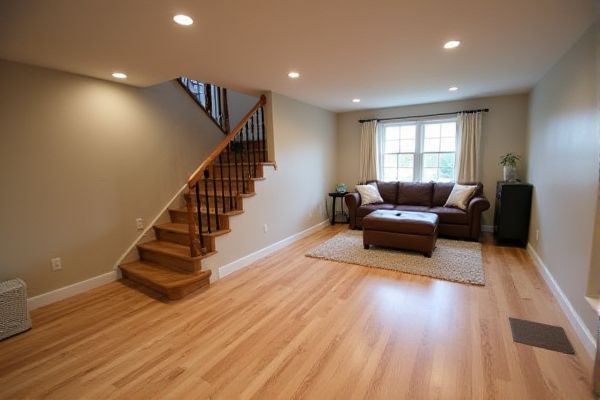
LVP flooring offers superior water resistance and durability in basement environments compared to laminate, making it an ideal choice for areas prone to moisture. Discover which option best suits your basement needs by reading the full article.
Table of Comparison
| Feature | LVP Flooring | Laminate Flooring |
|---|---|---|
| Water Resistance | Highly water-resistant, suitable for basements prone to moisture | Limited water resistance, can warp or swell if exposed to moisture |
| Durability | Durable, scratch-resistant, ideal for high-traffic areas | Durable but less resistant to moisture-related damage |
| Installation | Easy click-lock installation, floating or glue down options | Click-lock floating installation, requires moisture barrier in basements |
| Appearance | Realistic wood and stone textures with enhanced visuals | Good wood look but less realistic compared to LVP |
| Comfort | Softer and warmer underfoot with built-in padding options | Harder surface, may feel cold without added underlayment |
| Cost | Generally higher price point but long-lasting | More budget-friendly but may incur extra cost for moisture protection |
| Suitability for Basement | Highly recommended due to superior moisture resistance | Less recommended unless basement is completely dry and moisture-controlled |
Introduction to Basement Flooring Options
Basement flooring options include Luxury Vinyl Plank (LVP) and laminate, both designed to withstand moisture and provide durability. LVP offers superior water resistance and easy maintenance, making it ideal for damp basement environments, while laminate flooring provides a cost-effective and attractive solution with moderate moisture resistance. Your choice depends on factors such as moisture levels, budget, and desired aesthetic.
What is LVP Flooring?
LVP flooring, or luxury vinyl plank, is a durable and water-resistant flooring option ideal for basements where moisture is a concern. Unlike laminate flooring, LVP mimics the appearance of natural wood while offering superior resistance to humidity and spills. Your basement benefits from LVP's easy maintenance and long-lasting performance, making it a practical choice over traditional laminate in damp environments.
What is Laminate Flooring?
Laminate flooring is a multi-layer synthetic product designed to mimic the appearance of hardwood or stone, featuring a photographic applique layer under a clear protective wear layer. It is composed of a high-density fiberboard (HDF) core, which provides durability and resistance to everyday wear, though it is less moisture-resistant compared to luxury vinyl plank (LVP). In a basement setting, laminate flooring may require additional moisture barriers to protect against dampness, making LVP a more suitable choice for areas prone to humidity.
Moisture Resistance: LVP vs Laminate in Basements
Luxury Vinyl Plank (LVP) flooring offers superior moisture resistance compared to laminate flooring, making it ideal for basement installations where humidity and water exposure are common concerns. LVP's waterproof materials prevent warping, swelling, and mold growth, whereas laminate flooring tends to absorb moisture, leading to potential damage and reduced lifespan. Choosing LVP ensures greater durability and maintenance ease in damp basement environments.
Installation Process Comparison
Luxury vinyl plank (LVP) flooring offers a straightforward click-lock installation or adhesive method well-suited for basement environments due to moisture resistance. Laminate flooring typically requires a moisture barrier and floating installation on a level subfloor to prevent warping or swelling in damp basement conditions. Both flooring options benefit from underlayment, but LVP's waterproof properties often simplify installation and long-term durability in basements.
Durability and Lifespan
Luxury Vinyl Plank (LVP) flooring excels in durability for basement installations due to its water-resistant properties and ability to withstand moisture, preventing warping and mold growth common in below-grade areas. Laminate flooring, while affordable and scratch-resistant, tends to have a shorter lifespan in basements because it is more susceptible to water damage and swelling when exposed to humidity. For long-term durability and lifespan, LVP remains the superior choice in damp basement environments, offering resilience and minimal maintenance needs.
Comfort and Underfoot Feel
Luxury Vinyl Plank (LVP) flooring offers superior comfort and warmth underfoot compared to laminate flooring, making it ideal for basement spaces prone to cooler temperatures. LVP's flexible vinyl composition provides a softer, more cushioned feel, while laminate's hard surface can feel colder and less inviting. You can enhance underfoot comfort further with appropriate underlayment choices designed specifically for basement environments.
Style and Design Choices
LVP flooring offers a wide variety of realistic wood and stone patterns, providing versatile style options that mimic natural materials with high durability ideal for basement environments. Laminate flooring delivers numerous design choices with more vibrant color variations and textures, though it may be less moisture-resistant compared to LVP, making style selection dependent on your basement's specific conditions. Choosing between LVP and laminate allows you to tailor the look of your basement while balancing aesthetics with functional durability.
Maintenance and Cleaning
LVP (Luxury Vinyl Plank) flooring in basements offers superior moisture resistance and easy maintenance compared to laminate, which can swell or warp when exposed to water. Regular sweeping and damp mopping keep LVP floors looking pristine, while laminate requires more cautious cleaning to prevent water damage. Your choice of flooring impacts cleaning routines and long-term durability in the often damp basement environment.
Cost Analysis and Value
Luxury vinyl plank (LVP) flooring generally costs between $2 to $7 per square foot, offering a water-resistant and durable option ideal for basement environments prone to moisture. Laminate flooring typically ranges from $1 to $5 per square foot but may require additional moisture barriers, increasing overall expenses and reducing long-term value in damp basements. LVP provides better value through enhanced durability, water resistance, and low maintenance, resulting in lower replacement costs and higher resale impact in basement applications.
 homyna.com
homyna.com